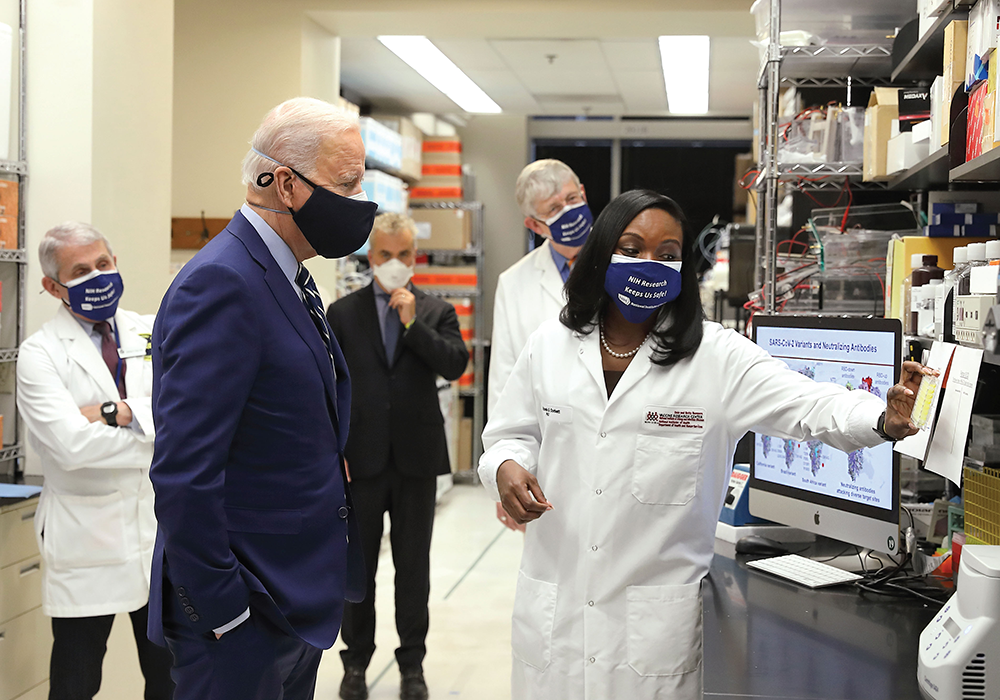Biomedical research is what transforms medicine. Oncology nurses see the evidence of that daily, from discoveries like immunotherapy that have revolutionized cancer treatment to novel nursing approaches to managing symptoms and adverse events. And thanks to the studies that brought a COVID-19 coronavirus vaccine to market in record-breaking time, the world understands research like never before, too.
Through bold, ambitious ideas and approaches, ARPA-H can help shape the future of health and medicine in the United States by transforming the seemingly impossible into reality. Ultimately, ARPA-H will propel us toward one goal: to directly improve the health of all Americans faster than we ever imagined to be achievable.
Building on that work and previous biomedical investments like the Cancer Moonshot Initiative, the Biden-Harris administration proposed a new entity during an April 2021 address to the U.S. Congress: the Advanced Research Projects Agency for Health (ARPA-H). President Biden presented it as an opportunity for the National Institutes of Health (NIH) to “develop breakthroughs—to prevent, detect, and treat diseases like Alzheimer’s, diabetes, and cancer. I can think of no more worthy investment.”
How ARPA-H Will Drive Discoveries
Much like the Moonshot, ARPA-H will use transformative technologies, applications, and platforms to improve health, medicine, and science in the United States by funding research into tangible solutions for patients and providers. And ARPA-H will mimic the Moonshot’s aggressive timeline to show the results of the investment, the administration said.
Although ARPA-H is an independent governmental division, it’s housed beneath NIH and able to draw on the larger institution’s substantial resources and expertise. The administration allocated $6.5 billion in the fiscal year 2022 budget to support ARPA-H.
NIH Director Francis Collins, MD, PhD, and newly confirmed Director of the White House Office of Science and Technology Policy (OSTP) Eric Lander, DPhil, have been on a virtual town hall circuit, presenting ARPA-H to the public through interviews and speaking directly to several specific communities, including nurses.
Collins, Lander, and colleagues Lawrence Tabak, DDS, PhD, NIH’s deputy director and deputy ethics counselor, and Tara Schwetz, PhD, NIH’s associate deputy director (and former acting director of the National Institute of Nursing Research [NINR]), described ARPA-H’s concept an article for Science. The new agency will duplicate the goals of the Defense Advanced Research Projects Agency (DARPA) from the 1960s, they said. Just like DARPA was authorized to fund investment in science and technology for national security, ARPA-H will promote similar work for health.
ARPA-H’s mission is to:
- Dedicate federal funding to potential breakthroughs by marrying technology and health in nontraditional research or commercial activity.
- Revolutionize prevention, treatment, and cure for chronic diseases that impact millions of Americans.
- Embrace ideas that are easily and quickly transformed to solve practical problems for tangible solutions.
- Promote equity, diversity, and inclusion in the process, from the molecular to the societal levels, for all people.
Nurses May Be Among the First to Benefit
In July 2021, one of the first public sessions about the agency was dedicated to nursing and health disparities. NINR Director Shannon Zenk, PhD, MPH, RN, FAAN, and National Institute for Minority Health and Health Disparities Director Eliseo J. Pérez-Stable, MD, spoke about how ARPA-H will improve the diversity and dynamics of patient-centered care:
- Fast-tracking interventions that would break down structural barriers to disparities
- Addressing systemic racism and discrimination
- Funding for holistic, patient-centered, community research from underrepresented scientists, including nurse researchers
- Promoting health equity among patients with chronic diseases, such as cancer, across the life course
- Addressing social, environmental, and economic determinants of health
Zenk specifically highlighted the opportunities for nurse scientists to conduct holistic research in those areas that would quickly and directly affect nursing practice in oncology and beyond.
ONS Perspective
As the most trusted profession for two decades, nurses have an important role in advancing changes in public health awareness. Advocating for U.S. Congress to support ARPA-H, ONS joined partners in the One Voice Against Cancer coalition to encourage federal appropriations funding into biomedical research investment. “ARPA-H holds the potential to quickly bridge the gap between the lab and the patient with targeted innovative therapies while simultaneously benefiting from and bolstering the bedrock research being done at NIH and the National Cancer Institute,” the coalition said in the formal letter.
By introducing ARPA-H, the Biden-Harris administration is recognizing that “recent advancements in biomedical science—from immunotherapy to treat cancer to the highly effective COVID-19 vaccines—demonstrate the strengths and successes of the U.S. biomedical enterprise. Such advancements present an opportunity to revolutionize how to prevent, treat, and even cure a range of diseases, including cancer, infectious diseases, Alzheimer’s disease, and many others that together affect a significant number of Americans.”
Nurses, and especially oncology nurses, are essential voices in the new agency. As the Society maintains its vital advocacy in support of patient-centered care, ONS members will see rapid advancements in research, treatment, and survivorship.






